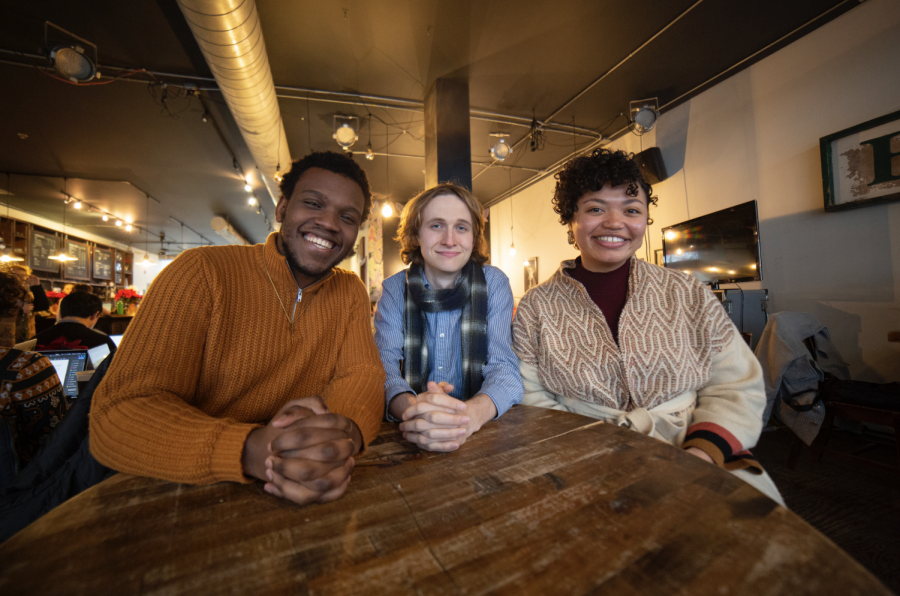In Bittersweet Move, House of the Lord Fellowship Finds New Space
From left to right, College fourth-years Jaris Owens, Griffin Woodard, and Miyah Byers. All three students are congregants of the House of Lord Fellowship.
When College fourth-years Miyah Byers, Jaris Owens, and Griffin Woodard were asked why they attend weekly services at the House of the Lord Fellowship despite not being regular churchgoers before starting at Oberlin, they just turned to each other and laughed. There was too much to say.
“We could talk about this for days,” Byers said.
For Byers, the House of the Lord is a space in which she can make meaningful connections with the congregation.
“I get to see my elders being vulnerable about their experience with God, and they’re sharing because they want me to hear and they want to hear what I have to say,” Byers said. “I feel so safe there. So seen, so heard, valued, and appreciated.”
For the past 17 years, the House of the Lord’s pastor, Reverend A.G. Miller, and his wife Reverend Brenda Grier-Miller have welcomed the congregation into their home for services. Now, the church is moving from the Millers’ basement to 125 South Pleasant Street, where the growing congregation will have more room to welcome new members and host community meetings. On Dec. 7, the church hosted a dedication ceremony to mark this bittersweet transition.
“We’re excited about being in this place,” Miller said. “It’s a little bit of fear and trepidation. … [I hope] that this will allow us to have better access to the community, to serve the community more and better, [and] to have a lot more outreach.”
According to Miller, his fellowship first began as a Bible study in the 1990s. Among the original members were Miller, Grier-Miller, and Phyllis Yarber Hogan, an Oberlin resident and former administrative assistant at the College. All three were part of a group called Oberlin Black Alliance for Progress, and they wanted an avenue both to express their faith and to support Black members of the Oberlin community.
“We started in 1995, just after the Million Man March, as a way to talk about what Black people can do for other Black people in this community to help lift them up,” Miller said.
Using faith as an avenue to advocate for social justice is at the core of Miller’s ministry.
The Oberlin House of the Lord Fellowship is one of several member churches in the national House of the Lord Church, which has a long history of leading issues of social justice and civil rights.
“The main church is a historic Black church in Brooklyn,” Miller said. “Our previous bishop, for more than 50 years, was one of the leading social and political activists in New York City. … Jesse Jackson announced his candidacy [for president] in the basement of our church in New York City.”
The previous bishop, Herbert Daughtry, is known for his long career in civil rights activism, beginning in New York in the 1950s. His daughter and current president prelate, Leah Daughtry, was the chief organizer of the Democratic National Convention Committee in both 2008 and 2016, and co-authored the 2018 book For Colored Girls Who Have Considered Politics. Both father and daughter spoke at last week’s dedication event, and their commitment to faith-based political activism was at the fore.
Members of Miller’s congregation find this same commitment to social justice thrives in Oberlin’s congregation.
“It serves as the activism,” Owens said. “I struggled to find a backing for my activism coming to Oberlin … I was [wondering], ‘What is my goal here?’ Is it justice, is it kindness? … Another spiritual way of being was opened for me when I came to this fellowship.”
In addition to church activism, all three students spoke about the impact that a Sunday service called ministry of arts has had on them. During this time, attendees are invited to showcase an artistic skill — playing an instrument, singing, sharing a poem, and everything in between. The rest of the congregation is asked to simply listen and appreciate the offerings.
“Ministry of the arts is a big one for me, because I ain’t never seen that in a church before coming to this one,” Owens said. “I’ve just never been to a church where they put so much emphasis on ‘God has given everyone gifts — please share them.’”
Woodard was also touched by the Sunday performances.
“Sometimes, someone will get up and play the piano and it will just wrench your heart out,” Woodard added.
Regardless where the church is located, the fellowship has created a space that feels like home. Byers, Owens, and Woodard all plan to stay connected with House of the Lord after they graduate this spring, no matter how far away their post-grad plans carry them.
“I’ve been to many churches, and none of them are like this one,” Woodard said. “My mom and dad can testify because when they came for my junior recital last year, I took them to the fellowship on that Sunday. My mom gave a testimony in the church … she was just like, ‘It’s so good to see that my son is in good hands.’ She actually broke down crying.”
Byers, who is on the verge of transitioning to post-college life, reflected on the significance of the fellowship taking a similar leap of faith.
“I feel like the new church building is really about opening up the arms to the community,” Byers said. “Not that they weren’t already open, because they were, but it’s kind of like when you put a seed in some dirt and you cover it and you’ve been watering it and watering it and now, all of a sudden, … it’s about to grow. It’s about to turn into a flower.”










